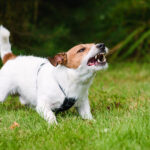Why Is My Dog Breathing Loud Through His Nose
Why is My Dog Breathing Loud Through His Nose? Exploring the Causes and Solutions for Noisy Respiration in Canines
If you have a dog who sounds like Darth Vader when he breathes, you may wonder what’s going on inside his snout. While some dogs are naturally loud breathers, others may develop respiratory problems that make them wheeze, snort, or snore excessively. In this article, we’ll dig deeper into the reasons why your dog may be breathing loudly through his nose and what you can do to help him breathe easier.
Causes of Noisy Breathing in Dogs
There are many possible factors that can affect your dog’s respiratory system and cause him to sound congested or strained. Here are some of the most common causes of noisy breathing in dogs:
Allergies: Just like humans, dogs can have allergic reactions to various environmental triggers such as pollen, dust, mold, or food ingredients. When a dog is exposed to an allergen, his immune system may overreact and produce inflammation in his nasal passages or lungs, leading to sneezing, coughing, or breathing difficulties. Allergic rhinitis or sinusitis can cause your dog to breathe noisily through his nose, especially if he also has nasal discharge or itchiness.
Infections: Bacterial or viral infections can affect your dog’s respiratory tract and cause him to exhibit symptoms such as coughing, wheezing, or panting. Kennel cough is a common respiratory infection that spreads among dogs in close quarters and can lead to honking coughs and gagging sounds. Pneumonia is a more serious infection that can cause fever, lethargy, and labored breathing in dogs. If your dog has an infection that affects his nose or throat, he may breathe louder than usual as his body fights off the invaders.
Anatomical abnormalities: Some dog breeds are more prone to having certain structural defects that can impede their breathing or cause them to snort or snuffle. Brachycephalic breeds such as pugs, bulldogs, and boxers have short muzzles and compressed airways that make it harder for them to breathe normally, especially in hot or humid weather. Other breeds may have elongated soft palates, collapsed tracheas, or narrowed nostrils that create noisy breathing patterns.
Obesity: Just like humans, dogs who carry excess weight are more likely to experience breathing problems due to the extra pressure on their respiratory system. If your dog is overweight or obese, he may pant heavily or snore loudly when he sleeps or exercises. Losing weight can help alleviate some of the strain on his lungs and improve his overall health.
Heart disease: In some cases, a dog’s loud breathing may be a sign of an underlying heart condition that affects his circulation and oxygenation. Heart murmurs, arrhythmias, congestive heart failure, and other cardiac problems can cause labored breathing, coughing, and wheezing in dogs. If you notice that your dog’s breathing has become louder or more irregular over time, you should consult a veterinarian to rule out any serious issues.
Solutions for Noisy Breathing in Dogs
Depending on the cause of your dog’s loud breathing, there are different ways to help him breathe more quietly and comfortably. Here are some possible solutions:
Treat allergies: If your dog has allergies that affect his respiratory tract, you may need to identify the triggers and avoid them as much as possible. You can also give your dog antihistamines or steroids prescribed by a vet to reduce the inflammation and itching in his nose or throat. In severe cases, immunotherapy or allergy shots may be recommended to desensitize your dog’s immune system to the allergens.
Manage infections: If your dog has a bacterial or viral infection, he may need antibiotics or antivirals to fight off the pathogens. In some cases, supportive care such as humidifiers, steam therapy, or cough suppressants may also be helpful. It’s important to follow your vet’s instructions and finish the full course of medication to prevent the infection from recurring.
Correct anatomical defects: If your dog has a structural problem that affects his breathing, he may benefit from surgical correction or medical management. For example, brachycephalic dogs may need surgery to widen their nostrils or shorten their palates to improve their airway flow. Dogs with collapsed tracheas may need anti-inflammatory medication or weight loss to reduce the pressure on their windpipes.
Manage weight: If your dog is overweight or obese, you should work with your vet to create a diet and exercise plan that helps him shed pounds in a healthy way. You can also provide your dog with low-calorie treats and toys that encourage more physical activity and mental stimulation. Losing weight can not only help your dog breathe better but also reduce his risk of other health problems such as diabetes, arthritis, and cancer.
Treat heart disease: If your dog has heart disease, he may need medications such as diuretics, ACE inhibitors, or beta-blockers to manage his symptoms and improve his cardiac function. Regular check-ups with a cardiologist can help monitor his progress and adjust his treatment plan as needed. In some cases, surgery or implantation of a pacemaker may be necessary to treat specific heart conditions.
Conclusion
Noisy breathing in dogs can have various causes and solutions depending on the underlying factors involved. By understanding why your dog is breathing loudly through his nose and seeking professional advice from a qualified veterinarian, you can take steps to improve his quality of life and help him breathe easier. Whether it’s managing allergies, treating infections, correcting anatomical defects, controlling weight, or treating heart disease, there are many ways to help your furry friend enjoy a quieter and healthier life. So next time your dog sounds like he’s snoring on your lap, don’t just laugh it off – listen carefully and act accordingly!



